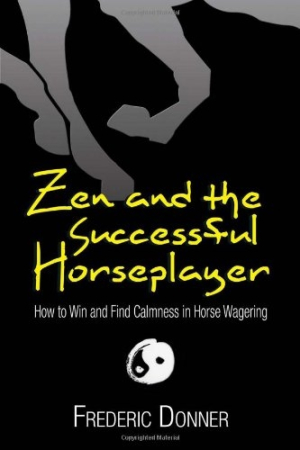Zen and the Successful Horseplayer
How to Win and Find Calmness in Horse Wagering
Betting on horse races is a huge industry in the United States. Frederic Donner’s Zen and the Successful Horseplayer: How to Win and Find Calmness in Horse Wagering is an entertaining introduction to this popular form of gambling. “The purpose of this book is to make anyone who reads it a more successful horseplayer,” writes Donner. He also intends to expand the reader’s knowledge of Zen philosophy.
In the first part of the book, Donner offers a detailed discussion of handicapping techniques. He begins with an introduction to the Daily Racing Form: “Any serious handicapper knows that without the use of the DRF any likely possibility of winning at the races is minimal.” He goes on to explain other factors in picking a winning horse, ranging from speed numbers to how the horse looks on the track. Some of the author’s observations are helpful and easily comprehended: “As a handicapper, I have found zero correlation between ownership of horses and success on the racetrack.” Other information, such as the discussion of Beyer Speed Figures and the pace of the race, is technical, and requires careful reading and analysis. Unfortunately, after the introductory material, Donner assumes a basic knowledge of horse racing and wagering on the part of the reader that may not be accurate.
In the second part of Zen and the Successful Horseplayer, Donner introduces the reader to basic concepts of Zen. “Zen is traditionally seen as enlightenment or awakening and, finally, as ethics and a means of conducting oneself.” In horse wagering, he explains, it is important to establish a Zen-like center of calmness, humility, and balance—qualities applicable to life in general, he notes. Additionally, the entire book is interspersed with koans, Zen parables, and stories that illustrate the author’s points. Donner’s koans include poetry and quotations from Zen masters, writers, and even comedians such as Steve Martin.
Donner makes a strong case for the connection between Zen and wagering on horses: “Zen is all about seeing what is, not what we want, or what we expect to see.” He explains that Zen stresses a broad view of the world, keeping calm and balanced, and maintaining perspective. Two valuable appendices—one on Zen and Eastern philosophies, the other on horses and horse wagering—provide essential guides for further reading. Thus, the reader expecting to improve his odds at the racetrack is invited to begin a much deeper exploration of Zen and other philosophies.
While Donner’s writing is clear and well organized, the book’s overall presentation is uninviting. The cover art and interior illustrations are dark. Graphs and pages reproduced from the DRF are often difficult to read.
The author, a special agent with the FBI who specializes in anti-narcotic and counter-terrorism activities, has been betting on horses for more than twenty-five years. It’s a good bet that anyone who reads Zen and the Successful Horseplayer with an open mind may find their life changed by the experience.
Reviewed by
John Senger
Disclosure: This article is not an endorsement, but a review. The publisher of this book provided free copies of the book and paid a small fee to have their book reviewed by a professional reviewer. Foreword Reviews and Clarion Reviews make no guarantee that the publisher will receive a positive review. Foreword Magazine, Inc. is disclosing this in accordance with the Federal Trade Commission’s 16 CFR, Part 255.

